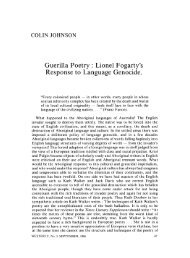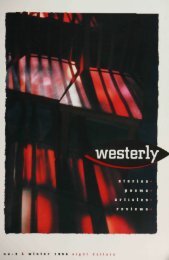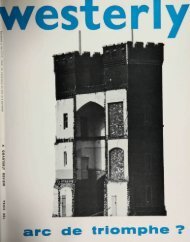emphasised (I think) in the reference to intentionand communication. It is Porter's great recurrenttheme that communication and knowledge areto be sought but not found except at bestintermittently: the notation of pain is not pain,and how can something which exists outsidelanguage ever be agreed upon? The clubbableold veteran, the buffer at the Mars Bar "knows"reality is straightforward, its meaning iscommonsensical and rock solid and he will hityou with it if your commonsense disagrees. Theexperience dramatised in Porter's poetry is of aworld constantly invoking then evading ourattempts to order it, and better represented bythat anarchic element, the wind, which the"unsavoury" others tangle with - whethersurfing or writing modern poetry.If I had to make a final choice, then, for meMars is less satisfying formally as poetry thanPorter's other recent works, The AutomaticOracie, Fast Forward and Collected Poems. Butas Porter's poems reveal, what is final is beyondour saying, and the reader interested in one ofthe most rewarding contemporary poets canhappily choose all.Lawrence BourkeRobert Gray, Piano, Angus & Robertson, 1987,$12.95.In his column in the Sydney Morning Herald,Don Anderson recently posed the question:"Can the rumoured Decline of Poetry have beenprovoked by the absence from modern verse offorms and satisfactions previously available?"I would suggest, however, that rumours ofsuch a "decline" are no mere modernphenomenon. They have been rife since theTrojans first deplored Homer's prostitution ofthe Muse in that well known piece of Greekpropaganda, The [Iliad. This suggests, at anyrate, that it is not simply an absence of "forms"that generates them. Heather Cam, respondingto Anderson, declared that Australian poetry, atleast, far from being in decline, is alive and well,and heading in many directions: "towards more'womanspeak', more Aboriginal and traditionaloral material, more multicultural voices, andpossibly more experimentation with collaboration."Cam thus envisages the revitalisation of106poetry from the fringes, the creation of newpoetic wealth from the conquered territories ofnew worlds.Robert Gray, however, in his latest volume ofpoems, Piano, has returned to the Old World torevitalise his poetry. The book is, in part, a reevaluationof the idyllic dharmic days of hisimagistic nineteen seventies. The haiku,although still present is no longer quite thesupreme ideal it once was. Instead, there areexperiments with traditional rhyme, half-rhyme,assonance and alliteration. There is nothing yetquite so formal as a sonnet or regular as blankverse, but, as its title may suggest, this volumehas been written more obviously with an ear tosound than has previously been the case. Thischange is-not only formal. There is evidence thatGray has re-evaluated the ahistorical perspectiveof his old imagistic attitudes. There is arealisation that there is more to change than alamentable, eternal transience.There are still haiku (" 17 Poems from theJapanese'') and still dharmic sentiments. "AGarden Shed", for example, concludes with thepoet describing the circumstance when he beganto understand thatthe less we think we arethe more we can bear; and someone who seeshe is nothing, lightly will bear it all.Despite the poem's sentimental attachment ofthese ideas to an experience in his grandfather'sgarden shed, there seems little intrinsicconnection between the image of the shed itselfand the lesson of the final lines. One feels thatjust about any experience could be made toproduce the same result. Perhaps it is the lessonitself that has become too trite and a little toomuch like the iteration of dogma instead of agenuine discovery. Similar observations may bemade of "The Shark", a too-neat allegory aboutdelving into the psyche, discovering the sharklikeid that needs to be controlled by dharmicmeans. "Plurality", on the other hand, is a moreinteresting piece. It reviews the "tranquil earlyeighties", but then tires itself out in the thinatmosphere of Tibet, and the observation thatlife is "oneness, always plural".Overall, however, Piano is not a tired book.It is a book searching for a way out of thistiredness. "A Summer Evening", "Nine Bowls ofWater", "Walking Around at Night" and "BlackLandscape" are outstandingly successft:'WESTERLY, No.2, JUNE, 1989
examples of a new type of Gray lyric, when thesharp, apposite image one has come to expectis surprisingly varied and enlivened by theintroduction of rhyme and more regularrhythms. Another, "Harbour Dusk", shows howGray has taken a favourite subject of his andgiven it a new and completely individual life,even compared to such successful pieces as "TheDusk" (from Grass Script) and "Watching theHarbour" (from The Skylight):She and I had come wandering there throughan empty park,and we laid our hands on a stone parapet'sfading life. Before us, across the oily,aubergine darkof the harbour, we could make out yachts -beneath an overcast sky, that was mauveunderlit,against a far shore of dark, crumbling bush.Part of the city, to our left, was fruit shopbright.After the summer day, a huge moist hush.The yachts far across their empty fields ofwater.One, at times, was gently rested like a quill.They seemed to whisper, slipping amongsteach other;always hovering as though resolve were ill.Away off, through the strung Bridge, a skyof mulberryand orange chiffon. Mauve-grey, each clovensaillikenursing sisters, in a deep corridor: somemelancholy;or nuns, going to an evening confessional.Compared to "Watching by the Harbour", themelancholy mood is evoked with subtlety."Harbour Dusk" does not need to rely onaccumulated metaphors of changefulness andthe assertion of rather outlandish (for Gray)Jeremial rhythms to spell out its essentialmessage of transience. Here, the message is thedying fall and the melancholy mood created bythe pianissimo of the rhythm.Piano, although perhaps lacking some of thepassion of earlier observations such as "Flamesand Dangling Wire" and "The Meatworks",takes its mood from the title, and the poem,"Piano", sets the agenda in other ways."Piano" is a short Beckett-like piece ofmonologue, written, apparently, from the pointof view of an aging man who contemplates thepassing parade of youth and hence of life. Thusis set the mood of re-evaluation andchangefulness, but without making a majorWESTERLY, No.2, JUNE, 1989statement. Formally, too, the poem is slight,composed of one and two word lines, and oneand two line stanzas. Hence the minor key is setas the book's dominant mode. The poem getsits effect musically by the repetition of key wordsand phrases in different thematic contexts,producing an incantory, steam of consciousnesseffect:afternoonpromenadelateafternoonclosinga wood gatepalingyardspromenadeIt is interesting to compare this poem to oneof the haiku inspired poems, "Eight Poems AfterKusadao", whose form is superficially similar, inorder to appreciate Gray's movement fromimagistic criteria towards a more musical stance:twothingsthat havenomemoriesfreshfallensnowaleapingsquirrelFinally, the piano, of course, can also beregarded as an instrument, which in itself, issuggestive of "play". In Piano one strongly gainsthe impression that Gray is consciously playingwith technique, playing new variations on oldthemes. Perhaps the keynote to the volume canbe found, appropriately, in the poem "AfterWriting All Day", which, again, is set by theharbour, where the poetry, like the light abovethe water "is an ornament, not yet crepuscular,/a baroque, passing into rococo goldenness ".In contrast to these short lyrics, the volumeends with a long discursive poem, "Under the107
- Page 3 and 4:
CONTENTSWESTERLYVOLUME 34, No.2, JU
- Page 5:
WESTERLYa quarterly reviewISSN 0043
- Page 8 and 9:
JAN KEMPTo My Father, M.H.K.My fath
- Page 10 and 11:
JAN KEMPThe GypsySuddenly before yo
- Page 12 and 13:
WONG PHUI NAMA Death in the WardThe
- Page 14 and 15:
WONG PHUI NAMCousinI had to call to
- Page 16 and 17:
WONG PHUI NAMObitIt is as thin smok
- Page 18 and 19:
So thus I lie here fearful of movem
- Page 20 and 21:
VIRGINIA BERNARDA ValedictionWhen N
- Page 22 and 23:
"Yeah, yeah," I call, returning the
- Page 24 and 25:
she flops for a bit, slurps her tea
- Page 26 and 27:
well her students did, she was neve
- Page 28 and 29:
English or Indian, that they had th
- Page 30 and 31:
ANDREW TAYLORSpringSpring is a dive
- Page 32 and 33:
CAROL SElTZERAiming for the MouthTr
- Page 34 and 35:
GRAEME WILSONA Selection of Japanes
- Page 36 and 37:
a highly ambivalent attitude to his
- Page 38 and 39:
Esson attended some rehearsals of T
- Page 40 and 41:
the literary life of Bloomsbury. Lo
- Page 42 and 43:
Without Yeats Esson would quite lik
- Page 44 and 45:
"What theatre do you have in Austra
- Page 46 and 47:
In the back room Esson could feel t
- Page 48 and 49:
"When we started our little theatre
- Page 50 and 51:
a screen against a wall. A theatre
- Page 52 and 53:
VINCENT O'SULLIVANSinging Mastery:
- Page 54 and 55:
flighty relation in most statements
- Page 56 and 57:
living and the dead; that places hi
- Page 58 and 59: quite diverse traditions towards th
- Page 60 and 61: WARRICK WYNNEThe Wetlands (for Liam
- Page 62 and 63: JAN OWENSmileOur mother aimed the b
- Page 64 and 65: RICHARD KELLY TIPPINGOlympic Airway
- Page 66 and 67: DAVID REITERBear by the Jasper Road
- Page 68 and 69: (At twenty eight you did not bother
- Page 70 and 71: left, would have risen and walked o
- Page 72 and 73: He had hair like mine used to be, t
- Page 74 and 75: OLIVE PELLThe QuestionTell me how t
- Page 76 and 77: BRIAN MOONANAT 515: MASS LECTURE Th
- Page 78 and 79: PETER KIRKPATRICKTear HereThe bay i
- Page 80 and 81: JOHN WINTERThe Bird ManIn wooded, p
- Page 82 and 83: KNUTE SKINNERAugust 15There's a lig
- Page 84 and 85: M.E. PATTI WALKERThe Hook"Aren't yo
- Page 86 and 87: QMNQMNQMNQMNapartheid man, this is
- Page 88 and 89: QMNQMNQMNeasy because you don't bel
- Page 90 and 91: lands or which have been taken over
- Page 92 and 93: GEOFF GOODFELLOWToo MuchDianne is 1
- Page 94 and 95: SHANE McCAULEYSouth Fremantle, Summ
- Page 96 and 97: JEAN KENTWaiting Out the DroughtWai
- Page 98 and 99: STEPHEN MAGEEJesus Falls, South Aus
- Page 100 and 101: SIMON BROWNBlue Hole, Santothe colo
- Page 102 and 103: CONAL FITZPATRICKA Brown Dog, Off A
- Page 104 and 105: PAUL HETHERINGTONOne RoomIn teeming
- Page 106 and 107: society, or, in the terms of the my
- Page 110 and 111: Summer Leaves". This continues the
- Page 112 and 113: Deficiency Bill in Western Australi
- Page 114 and 115: invocation of pastoral near the beg
- Page 116 and 117: particularly dreaded). The final re
- Page 118 and 119: VINCENT O'SULLIVAN - is one of New







